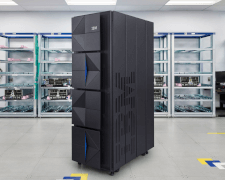Mainframe
A mainframe computer is a powerful computer meant for high-volume data processing. Mainframes have a large amount of memory, many parallel processors, and a high data input/output capacity. Large organizations and business use mainframes for high-volume data analysis, database management, resource tracking, and transaction processing. Mainframe computers are considered the second-most powerful variety of computers after supercomputers.
A key element of a mainframe computer's design is a focus on reliability and uptime. Mainframes need to be scalable so that organizations can add more capacity when needed. They are also designed with redundant parts so that any failure does not disrupt the mainframe's operations. Administrators can even hot-swap components in and out of a mainframe without turning it off, which allows most mainframes to go years without a reboot. Support for advanced virtualization lets a single mainframe run thousands of virtual machines. All this helps a mainframe handle mission-critical, high-volume tasks; for example, banks use mainframes to process thousands of transactions per second, all day, every day.
Mainframes use specialized hardware unlike anything available in consumer desktop computers. They use specially-designed processors with a high number of processor cores, designed to work in parallel with up to 32 processors at once. They also run specialized mainframe operating systems, like IBM's z/OS or mainframe variants of Linux.
 Test Your Knowledge
Test Your Knowledge